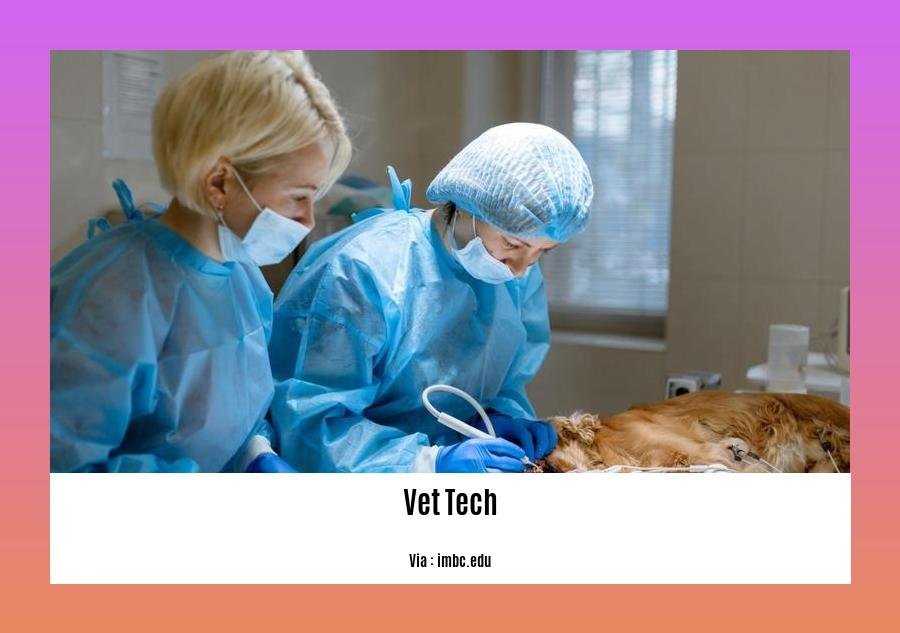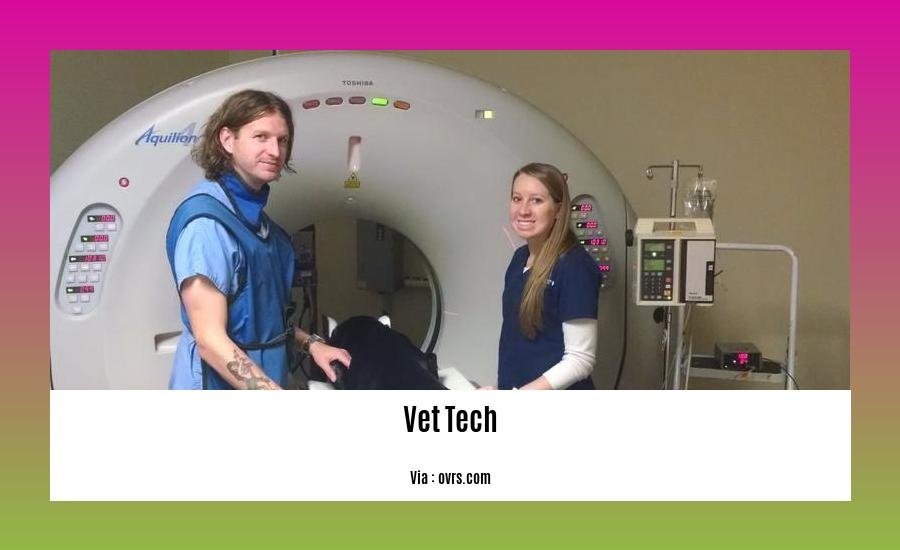Can a Vet Tech Become a Vet: Transitioning Careers in Veterinary Medicine
Are you a job seeker with a pre-vet degree wondering if you can become a vet tech? Or perhaps you’re already a seasoned veterinary technician looking to take your career to the next level and become a veterinarian. In this article, we will explore the possibilities and requirements for transitioning from a vet tech to a veterinarian. Whether you’re starting with a pre-vet degree or have years of experience working in animal clinics, we’ll provide you with valuable insights and guidance on how to make this exciting career transition in the field of veterinary medicine.
Key Takeaways:
- A vet tech cannot become a veterinarian without earning a degree in veterinary medicine.
- Vet techs have alternative career advancement opportunities, such as specializing in specific areas of veterinary medicine.
- Steps to becoming a veterinarian typically include deciding on a specialization, earning a bachelor’s degree in animal biology or related field, earning a doctorate in veterinary medicine, gaining experience, obtaining a veterinary license, and completing an optional internship or residency.
- To become a vet technician, a two-year associate degree and a license are typically required.
Can a Vet Tech Become a Vet: Transitioning Careers in Veterinary Medicine


The veterinary field is a diverse and rewarding profession that offers various career paths. As a seasoned veterinary technician, you may be wondering if it is possible to transition from your current role to becoming a veterinarian. In this article, we will explore the requirements, educational paths, and possibilities for vet techs who aspire to become veterinarians.
Is it Possible for a Vet Tech to Become a Veterinarian?
The short answer is yes, it is possible for a vet tech to become a veterinarian. However, it requires additional education and training. As a vet tech, you have valuable experience and knowledge in the field of veterinary medicine, which can be an advantage as you pursue your goal of becoming a veterinarian.
Steps to Transition from Vet Tech to Veterinarian
Choose your Specialization: Before diving into the process of becoming a veterinarian, it is essential to determine your area of interest within veterinary medicine. Whether it’s small animal care, exotic species, or specific specialties like surgery or cardiology, having a specialization in mind will help guide your educational and career decisions.
Earn a Bachelor’s Degree: To gain admission to a Doctor of Veterinary Medicine (DVM) program, most schools require applicants to have a bachelor’s degree in a related field. Pursuing a degree in animal biology, general biology, or natural science can provide you with a solid foundation for veterinary studies.
Obtain a DVM Degree: Once you have completed your bachelor’s degree, the next step is to enroll in a DVM program. This program typically takes four years to complete and includes both coursework and hands-on clinical experience. Make sure to research and choose an accredited veterinary school that aligns with your educational and career goals.
Gain Practical Experience: While studying for your DVM degree, it is crucial to gain practical experience in the veterinary field. This can be achieved through internships, externships, and volunteering opportunities at animal clinics or hospitals. Practical experience will not only enhance your understanding but also provide valuable networking opportunities.
Obtain Veterinary License: After earning your DVM degree, you will need to obtain a veterinary license to practice as a veterinarian. The requirements for licensure vary by state or country, so it is essential to familiarize yourself with the specific regulations in your desired location.
Consider Internship or Residency (Optional): For those seeking further specialization or advanced training, pursuing an internship or residency program can be beneficial. These programs provide additional hands-on experience and mentorship in specific areas of veterinary medicine.
Advantages and Opportunities
Transitioning from a vet tech to a veterinarian offers several advantages and opportunities:
Extensive Experience: As a vet tech, you have hands-on patient care experience, which can give you a unique perspective as a veterinarian. Your background in animal care, surgical procedures, and diagnostic techniques will be advantageous throughout your career.
Knowledge of Veterinary Practices: Your years as a vet tech have provided you with a comprehensive understanding of veterinary practices, protocols, and procedures. This knowledge will contribute to your success as a veterinarian and allow you to provide high-quality care to your patients.
Compassionate Nature: The compassion and empathy you have shown as a vet tech will continue to be essential qualities as a veterinarian. Your ability to connect with both animals and their owners will enhance the client-patient relationship and contribute to positive outcomes.
Conclusion
While transitioning from a vet tech to a veterinarian requires additional education and training, it is indeed possible and can offer exciting career prospects. By following the necessary steps, gaining practical experience, and leveraging your existing expertise, you can achieve your goal of becoming a veterinarian. Your journey as a vet tech provides a strong foundation for your future success in veterinary medicine.
Can a vet tech become a veterinarian? Find out the answer here. can a vet tech become a veterinarian
Wondering if a veteran’s spouse can get medical benefits? Click here to learn more. can a veteran’s spouse get medical benefits
Can You Become a Vet Tech with a Pre-Vet Degree?
Aspiring individuals in the field of veterinary medicine often wonder if they can become a veterinary technician with a pre-vet degree. It’s a valid question, considering the overlap in these two career paths. Let’s delve into this topic and explore the possibilities.
Understanding the Educational Pathways
To become a veterinary technician, individuals typically need to complete a two-year associate’s degree in veterinary technology. This program provides comprehensive training in areas such as animal anatomy, physiology, laboratory techniques, and medical procedures. Graduates of this program can then pursue their certification and licensure as veterinary technicians.
On the other hand, to become a veterinarian, one must complete a four-year bachelor’s degree, followed by a doctorate in veterinary medicine. This advanced educational path prepares individuals to diagnose, treat, and care for animals at a higher level. While a pre-vet degree may provide a strong foundation for veterinary medicine, it does not fulfill the specific requirements to become a veterinary technician.
Transitioning from a Vet Tech to a Veterinarian
If you currently hold a pre-vet degree and are working as a veterinary technician, you may be wondering if it’s possible to transition from your role to that of a veterinarian. The answer is yes, but it requires additional educational and experience requirements.
To become a veterinarian, you’ll need to fulfill the following steps:
Complete a bachelor’s degree: If you already have a pre-vet degree, you may have already completed this step. However, it’s important to ensure that your bachelor’s degree aligns with the prerequisites for veterinary school.
Earn a doctorate in veterinary medicine: Admittance into veterinary school is competitive and requires a strong academic background. You will need to complete a doctorate program in veterinary medicine, which typically takes four years. This program will provide you with the necessary knowledge and skills to diagnose and treat animals.
Gain clinical experience: Throughout your journey to becoming a veterinarian, gaining practical clinical experience is of utmost importance. This experience can be obtained through internships, externships, or working in veterinary clinics. It allows you to apply your knowledge in a real-world setting and develop important skills that will further enhance your abilities as a veterinarian.
Obtain a veterinary license: After completing your doctorate in veterinary medicine, you will need to obtain a license to practice as a veterinarian. The requirements for licensure vary by state, but typically involve passing the North American Veterinary Licensing Examination (NAVLE).
Consider specialization or advanced education: Once you have become a licensed veterinarian, you may choose to pursue specialization in a specific area of veterinary medicine. This can be done through internships, residencies, or advanced degree programs.
Exploring Alternative Routes
While the traditional route to becoming a veterinarian involves completing a doctorate in veterinary medicine, there may be alternative routes available, depending on your location. Some states, such as Alaska, California, and Wisconsin, allow veterinary technicians to take the Veterinary Technician National Exam (VTNE) if they have a certain amount of work experience or complete an alternative training program.
It’s important to research the specific requirements and regulations in your state to determine if this is a viable option for you. Working with an advisor or mentor in the field can also help you navigate the various educational pathways available.
Key Takeaways:
- To become a veterinarian, individuals must complete a four-year bachelor’s degree and a doctorate in veterinary medicine.
- Veterinary technicians require a two-year associate’s degree in veterinary technology to become licensed and certified.
- Transitioning from a vet tech to a veterinarian necessitates additional educational requirements, including earning a doctorate in veterinary medicine.
- Gaining practical clinical experience is crucial for both vet techs and veterinarians.
- Some states may offer alternative routes for veterinary technicians to become licensed veterinarians.
- Conduct thorough research and seek guidance from advisors to determine the best educational pathway for your goals.
Sources:
– Indeed – Veterinary Technician Skills & Certification
– Purdue University College of Veterinary Medicine – How Do I Become a Veterinary Technician (Vet Tech)?
FAQ
Q1: Can a vet tech become a veterinarian without going back to school for a degree in veterinary medicine?
A1: No, it is necessary for a vet tech to go back to school and earn a degree in veterinary medicine to become a veterinarian.
Q2: What are the career advancement opportunities available for vet techs?
A2: Vet techs can choose to specialize in a certain area of veterinary medicine, such as dentistry or anesthesia, to advance their careers.
Q3: What educational requirements are needed to become a veterinarian?
A3: To become a veterinarian, one typically needs to earn a bachelor’s degree in animal biology, general biology, or natural science, followed by a doctorate in veterinary medicine.
Q4: Do vet techs require a license?
A4: Yes, vet techs need to obtain a license from the relevant authorities to practice as a vet tech.
Q5: Are there any alternative pathways for vet techs to become veterinarians?
A5: Some states allow vet techs to take the Veterinary Technician National Exam (VTNE) if they have sufficient work experience or complete an alternative training program. However, earning a degree in veterinary medicine is the most common pathway to become a veterinarian.












